Business Law Assignment: Employment Contracts and Dispute Resolution
VerifiedAdded on 2023/01/20
|10
|1865
|73
Essay
AI Summary
This business law assignment addresses three key areas of employment law. The first section analyzes employment contracts, examining the influence of legislation and case law on contract terms, including working time, minimum wage, and implied duties of both employers and employees. The second part compares and contrasts unfair and wrongful dismissal, detailing eligibility for claims, reasons for dismissal, and available remedies. It also explores the role of the Employment Rights Act 1996. The final section evaluates alternative dispute resolution (ADR) methods, such as mediation, conciliation, and arbitration, in comparison to court-based litigation, discussing their advantages and disadvantages. The assignment highlights the flexibility, cost-effectiveness, and confidentiality of ADR while acknowledging limitations regarding appeals and guaranteed resolutions. The content provides a thorough examination of employment law principles and dispute resolution strategies.
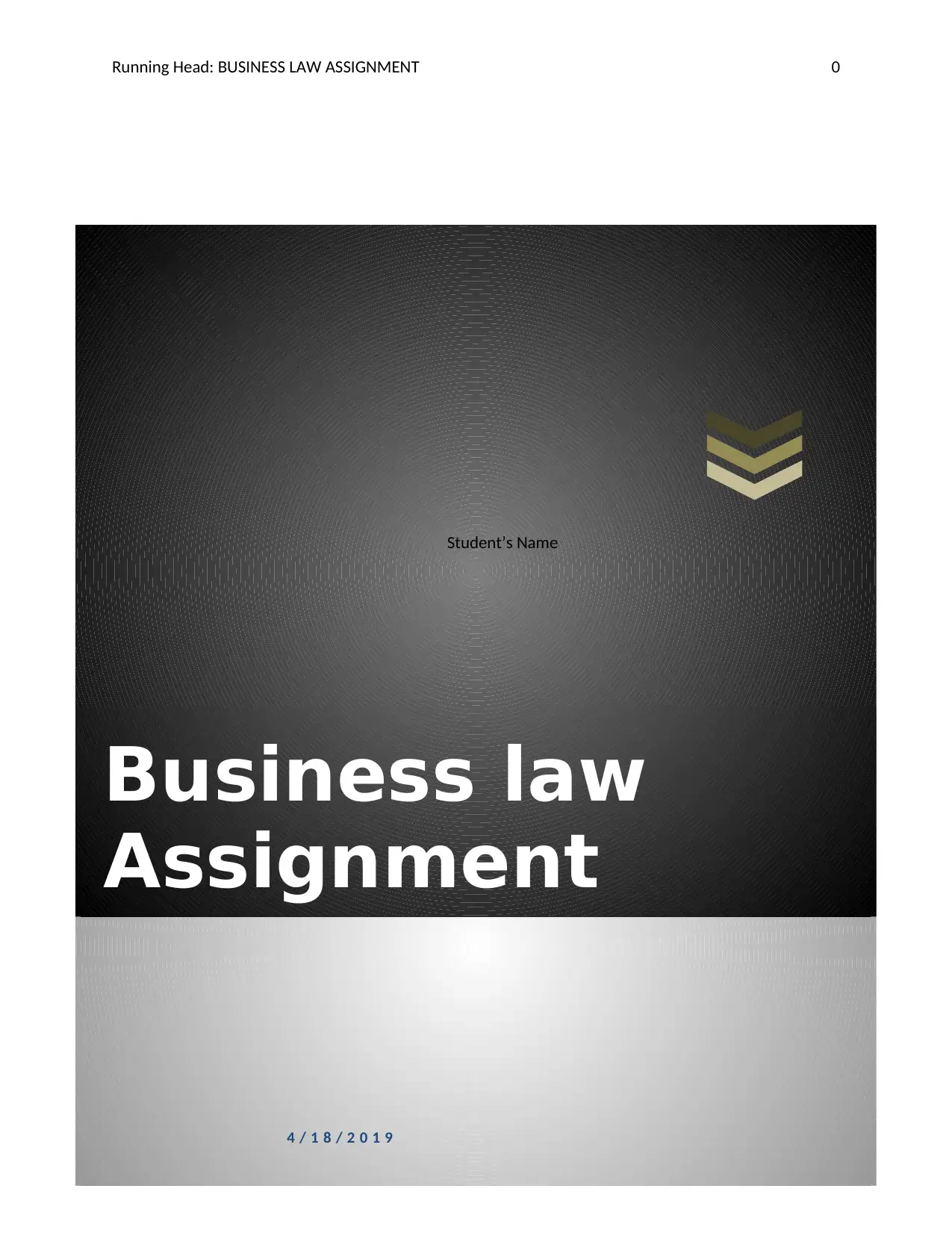
Business law
Assignment
Running Head: BUSINESS LAW ASSIGNMENT 0
4 / 1 8 / 2 0 1 9
Student’s Name
Assignment
Running Head: BUSINESS LAW ASSIGNMENT 0
4 / 1 8 / 2 0 1 9
Student’s Name
Paraphrase This Document
Need a fresh take? Get an instant paraphrase of this document with our AI Paraphraser
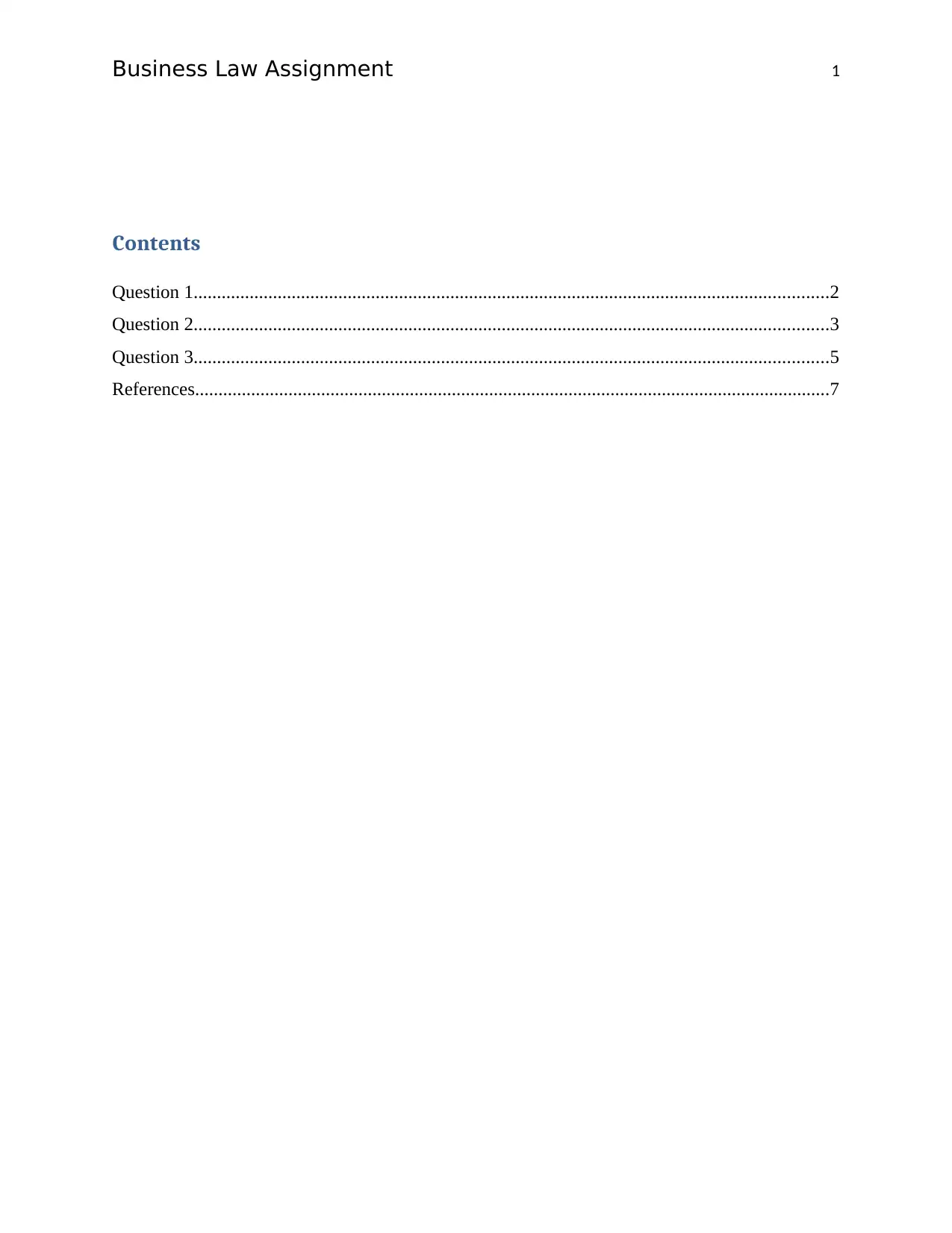
Business Law Assignment 1
Contents
Question 1........................................................................................................................................2
Question 2........................................................................................................................................3
Question 3........................................................................................................................................5
References........................................................................................................................................7
Contents
Question 1........................................................................................................................................2
Question 2........................................................................................................................................3
Question 3........................................................................................................................................5
References........................................................................................................................................7
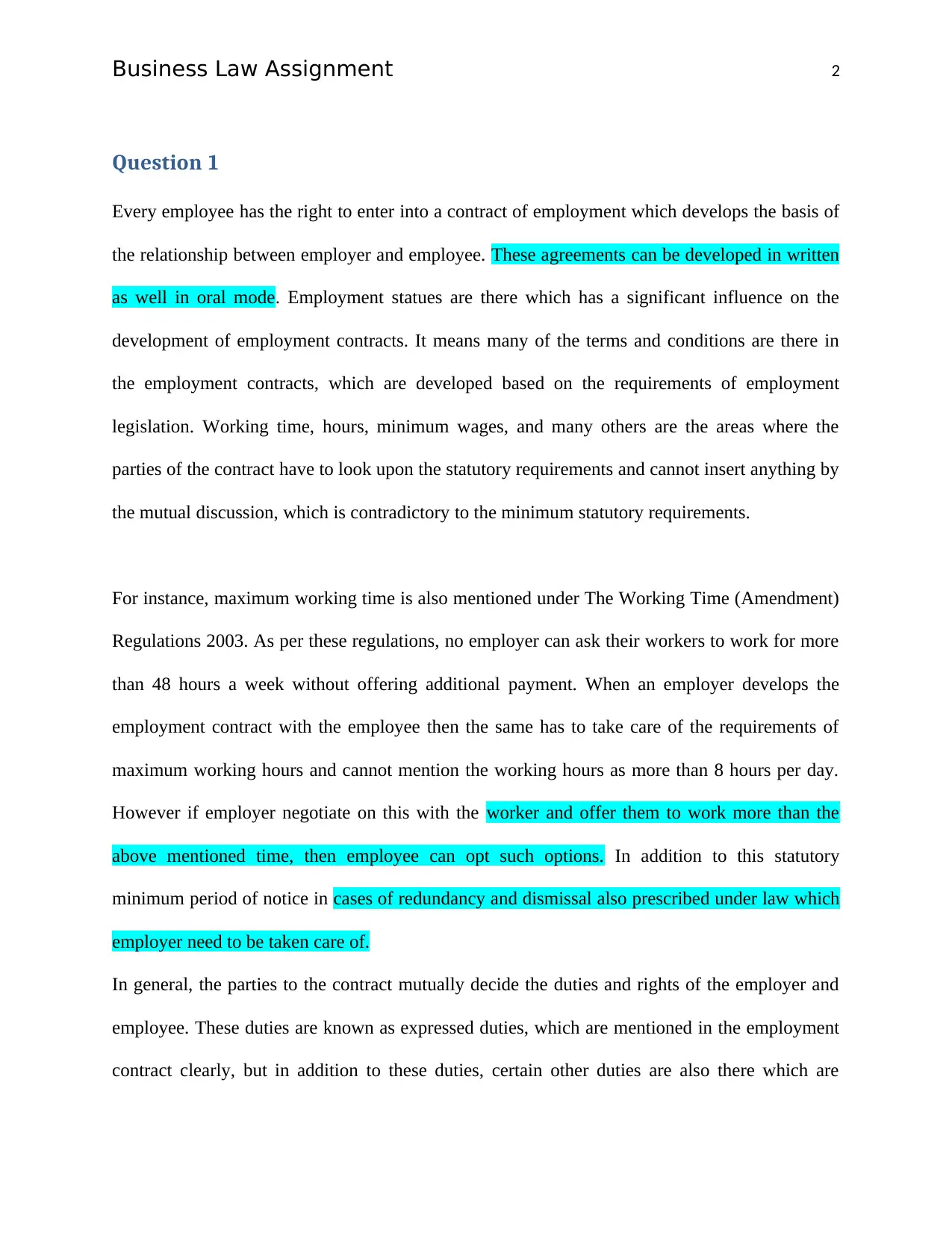
Business Law Assignment 2
Question 1
Every employee has the right to enter into a contract of employment which develops the basis of
the relationship between employer and employee. These agreements can be developed in written
as well in oral mode. Employment statues are there which has a significant influence on the
development of employment contracts. It means many of the terms and conditions are there in
the employment contracts, which are developed based on the requirements of employment
legislation. Working time, hours, minimum wages, and many others are the areas where the
parties of the contract have to look upon the statutory requirements and cannot insert anything by
the mutual discussion, which is contradictory to the minimum statutory requirements.
For instance, maximum working time is also mentioned under The Working Time (Amendment)
Regulations 2003. As per these regulations, no employer can ask their workers to work for more
than 48 hours a week without offering additional payment. When an employer develops the
employment contract with the employee then the same has to take care of the requirements of
maximum working hours and cannot mention the working hours as more than 8 hours per day.
However if employer negotiate on this with the worker and offer them to work more than the
above mentioned time, then employee can opt such options. In addition to this statutory
minimum period of notice in cases of redundancy and dismissal also prescribed under law which
employer need to be taken care of.
In general, the parties to the contract mutually decide the duties and rights of the employer and
employee. These duties are known as expressed duties, which are mentioned in the employment
contract clearly, but in addition to these duties, certain other duties are also there which are
Question 1
Every employee has the right to enter into a contract of employment which develops the basis of
the relationship between employer and employee. These agreements can be developed in written
as well in oral mode. Employment statues are there which has a significant influence on the
development of employment contracts. It means many of the terms and conditions are there in
the employment contracts, which are developed based on the requirements of employment
legislation. Working time, hours, minimum wages, and many others are the areas where the
parties of the contract have to look upon the statutory requirements and cannot insert anything by
the mutual discussion, which is contradictory to the minimum statutory requirements.
For instance, maximum working time is also mentioned under The Working Time (Amendment)
Regulations 2003. As per these regulations, no employer can ask their workers to work for more
than 48 hours a week without offering additional payment. When an employer develops the
employment contract with the employee then the same has to take care of the requirements of
maximum working hours and cannot mention the working hours as more than 8 hours per day.
However if employer negotiate on this with the worker and offer them to work more than the
above mentioned time, then employee can opt such options. In addition to this statutory
minimum period of notice in cases of redundancy and dismissal also prescribed under law which
employer need to be taken care of.
In general, the parties to the contract mutually decide the duties and rights of the employer and
employee. These duties are known as expressed duties, which are mentioned in the employment
contract clearly, but in addition to these duties, certain other duties are also there which are
⊘ This is a preview!⊘
Do you want full access?
Subscribe today to unlock all pages.

Trusted by 1+ million students worldwide
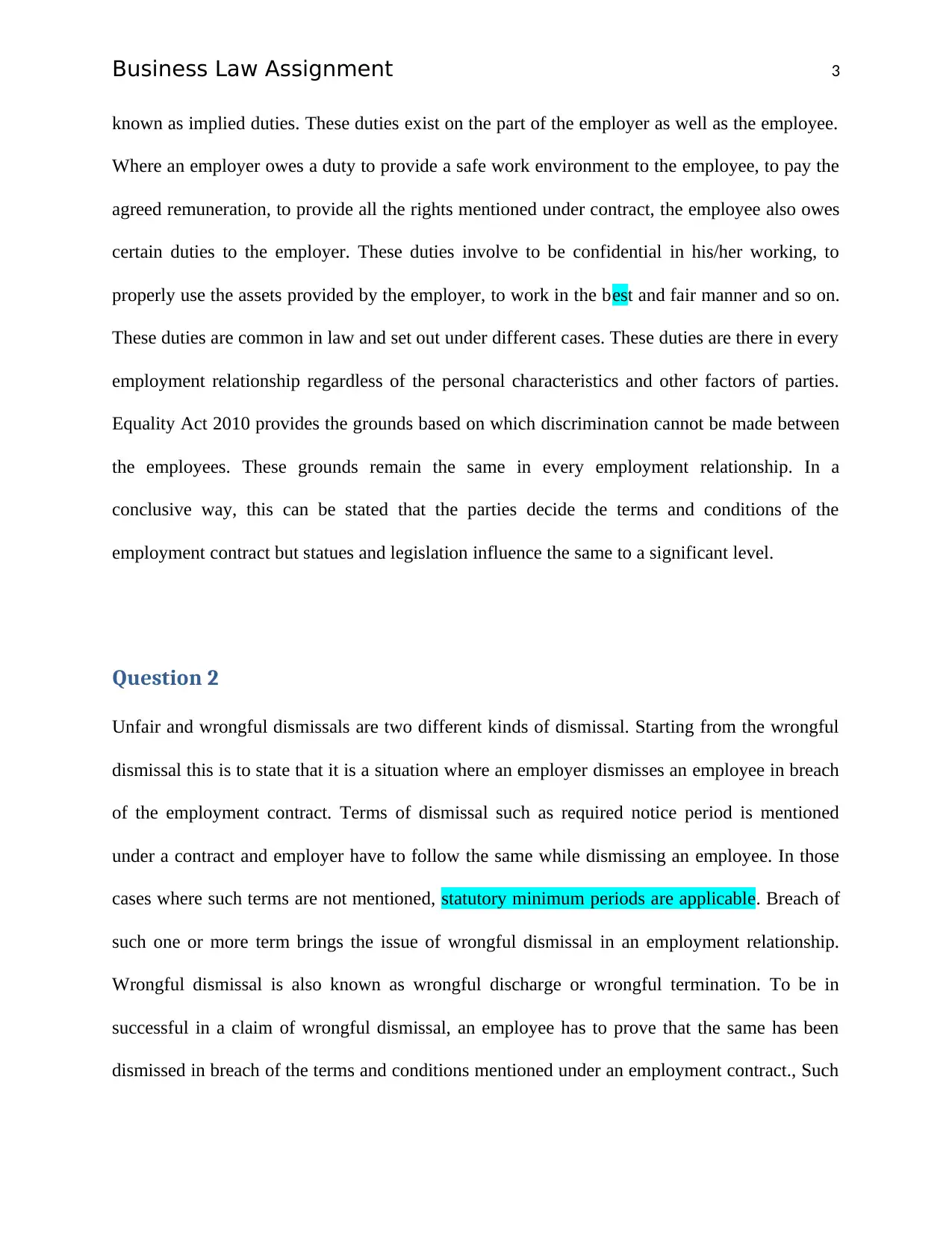
Business Law Assignment 3
known as implied duties. These duties exist on the part of the employer as well as the employee.
Where an employer owes a duty to provide a safe work environment to the employee, to pay the
agreed remuneration, to provide all the rights mentioned under contract, the employee also owes
certain duties to the employer. These duties involve to be confidential in his/her working, to
properly use the assets provided by the employer, to work in the best and fair manner and so on.
These duties are common in law and set out under different cases. These duties are there in every
employment relationship regardless of the personal characteristics and other factors of parties.
Equality Act 2010 provides the grounds based on which discrimination cannot be made between
the employees. These grounds remain the same in every employment relationship. In a
conclusive way, this can be stated that the parties decide the terms and conditions of the
employment contract but statues and legislation influence the same to a significant level.
Question 2
Unfair and wrongful dismissals are two different kinds of dismissal. Starting from the wrongful
dismissal this is to state that it is a situation where an employer dismisses an employee in breach
of the employment contract. Terms of dismissal such as required notice period is mentioned
under a contract and employer have to follow the same while dismissing an employee. In those
cases where such terms are not mentioned, statutory minimum periods are applicable. Breach of
such one or more term brings the issue of wrongful dismissal in an employment relationship.
Wrongful dismissal is also known as wrongful discharge or wrongful termination. To be in
successful in a claim of wrongful dismissal, an employee has to prove that the same has been
dismissed in breach of the terms and conditions mentioned under an employment contract., Such
known as implied duties. These duties exist on the part of the employer as well as the employee.
Where an employer owes a duty to provide a safe work environment to the employee, to pay the
agreed remuneration, to provide all the rights mentioned under contract, the employee also owes
certain duties to the employer. These duties involve to be confidential in his/her working, to
properly use the assets provided by the employer, to work in the best and fair manner and so on.
These duties are common in law and set out under different cases. These duties are there in every
employment relationship regardless of the personal characteristics and other factors of parties.
Equality Act 2010 provides the grounds based on which discrimination cannot be made between
the employees. These grounds remain the same in every employment relationship. In a
conclusive way, this can be stated that the parties decide the terms and conditions of the
employment contract but statues and legislation influence the same to a significant level.
Question 2
Unfair and wrongful dismissals are two different kinds of dismissal. Starting from the wrongful
dismissal this is to state that it is a situation where an employer dismisses an employee in breach
of the employment contract. Terms of dismissal such as required notice period is mentioned
under a contract and employer have to follow the same while dismissing an employee. In those
cases where such terms are not mentioned, statutory minimum periods are applicable. Breach of
such one or more term brings the issue of wrongful dismissal in an employment relationship.
Wrongful dismissal is also known as wrongful discharge or wrongful termination. To be in
successful in a claim of wrongful dismissal, an employee has to prove that the same has been
dismissed in breach of the terms and conditions mentioned under an employment contract., Such
Paraphrase This Document
Need a fresh take? Get an instant paraphrase of this document with our AI Paraphraser
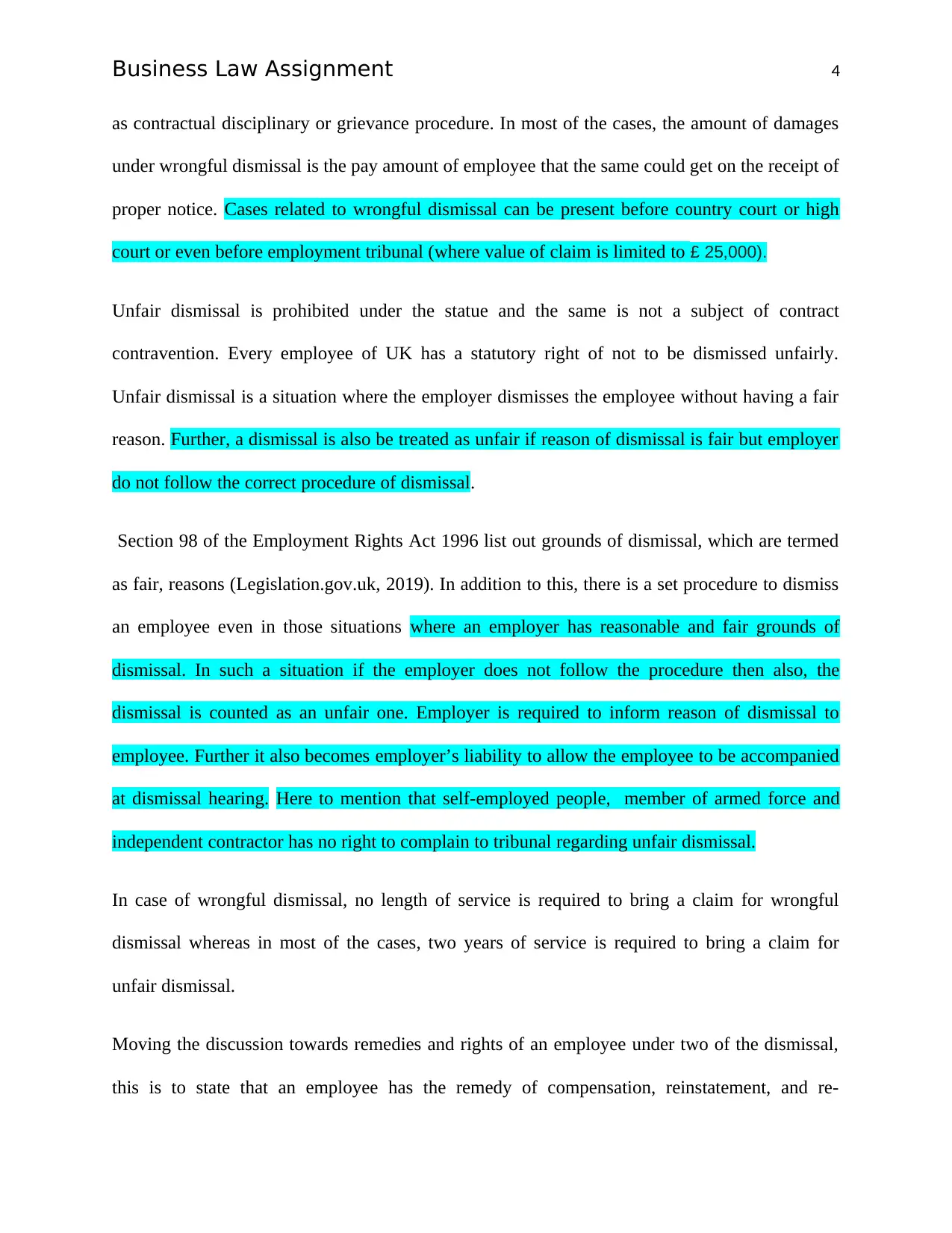
Business Law Assignment 4
as contractual disciplinary or grievance procedure. In most of the cases, the amount of damages
under wrongful dismissal is the pay amount of employee that the same could get on the receipt of
proper notice. Cases related to wrongful dismissal can be present before country court or high
court or even before employment tribunal (where value of claim is limited to £ 25,000).
Unfair dismissal is prohibited under the statue and the same is not a subject of contract
contravention. Every employee of UK has a statutory right of not to be dismissed unfairly.
Unfair dismissal is a situation where the employer dismisses the employee without having a fair
reason. Further, a dismissal is also be treated as unfair if reason of dismissal is fair but employer
do not follow the correct procedure of dismissal.
Section 98 of the Employment Rights Act 1996 list out grounds of dismissal, which are termed
as fair, reasons (Legislation.gov.uk, 2019). In addition to this, there is a set procedure to dismiss
an employee even in those situations where an employer has reasonable and fair grounds of
dismissal. In such a situation if the employer does not follow the procedure then also, the
dismissal is counted as an unfair one. Employer is required to inform reason of dismissal to
employee. Further it also becomes employer’s liability to allow the employee to be accompanied
at dismissal hearing. Here to mention that self-employed people, member of armed force and
independent contractor has no right to complain to tribunal regarding unfair dismissal.
In case of wrongful dismissal, no length of service is required to bring a claim for wrongful
dismissal whereas in most of the cases, two years of service is required to bring a claim for
unfair dismissal.
Moving the discussion towards remedies and rights of an employee under two of the dismissal,
this is to state that an employee has the remedy of compensation, reinstatement, and re-
as contractual disciplinary or grievance procedure. In most of the cases, the amount of damages
under wrongful dismissal is the pay amount of employee that the same could get on the receipt of
proper notice. Cases related to wrongful dismissal can be present before country court or high
court or even before employment tribunal (where value of claim is limited to £ 25,000).
Unfair dismissal is prohibited under the statue and the same is not a subject of contract
contravention. Every employee of UK has a statutory right of not to be dismissed unfairly.
Unfair dismissal is a situation where the employer dismisses the employee without having a fair
reason. Further, a dismissal is also be treated as unfair if reason of dismissal is fair but employer
do not follow the correct procedure of dismissal.
Section 98 of the Employment Rights Act 1996 list out grounds of dismissal, which are termed
as fair, reasons (Legislation.gov.uk, 2019). In addition to this, there is a set procedure to dismiss
an employee even in those situations where an employer has reasonable and fair grounds of
dismissal. In such a situation if the employer does not follow the procedure then also, the
dismissal is counted as an unfair one. Employer is required to inform reason of dismissal to
employee. Further it also becomes employer’s liability to allow the employee to be accompanied
at dismissal hearing. Here to mention that self-employed people, member of armed force and
independent contractor has no right to complain to tribunal regarding unfair dismissal.
In case of wrongful dismissal, no length of service is required to bring a claim for wrongful
dismissal whereas in most of the cases, two years of service is required to bring a claim for
unfair dismissal.
Moving the discussion towards remedies and rights of an employee under two of the dismissal,
this is to state that an employee has the remedy of compensation, reinstatement, and re-
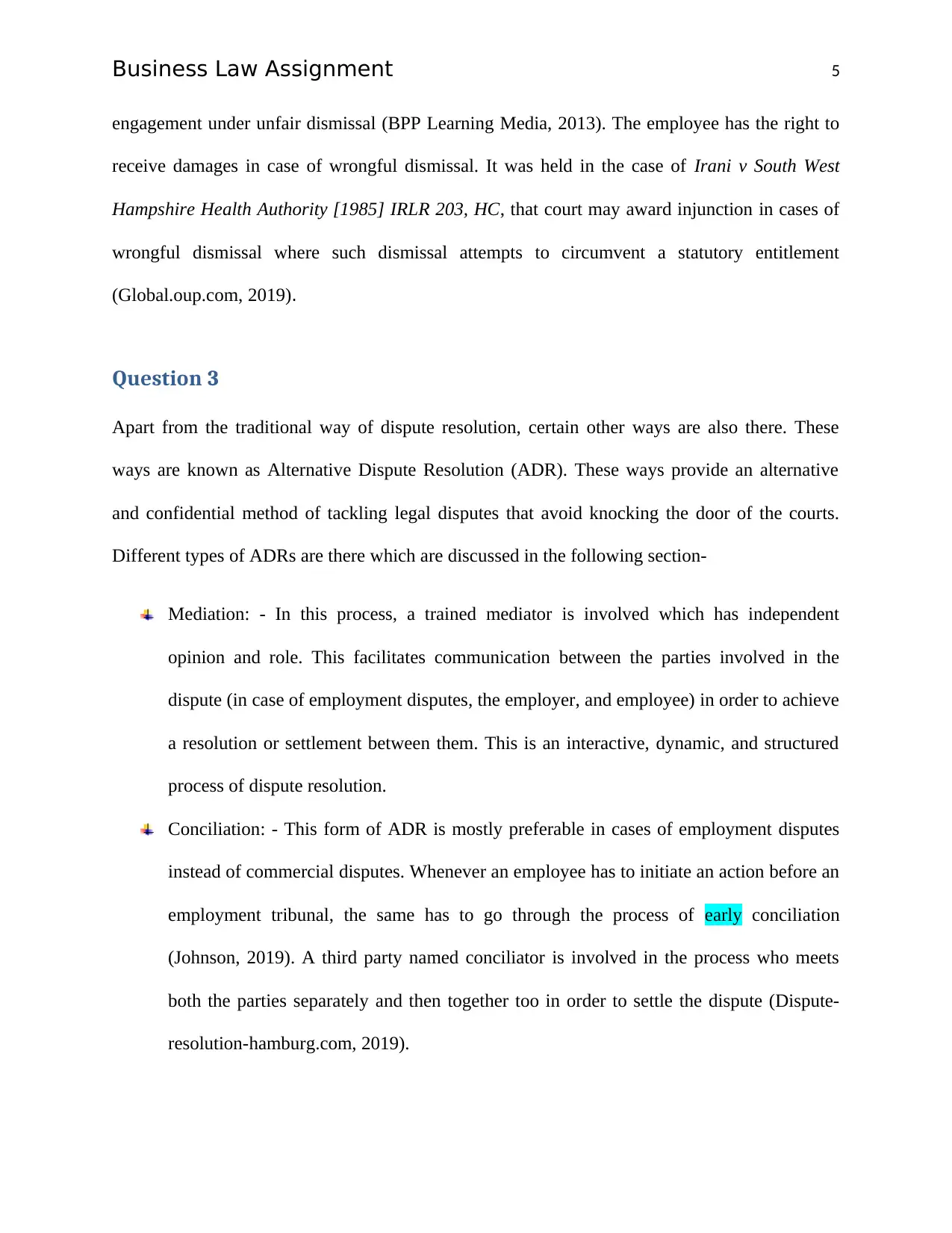
Business Law Assignment 5
engagement under unfair dismissal (BPP Learning Media, 2013). The employee has the right to
receive damages in case of wrongful dismissal. It was held in the case of Irani v South West
Hampshire Health Authority [1985] IRLR 203, HC, that court may award injunction in cases of
wrongful dismissal where such dismissal attempts to circumvent a statutory entitlement
(Global.oup.com, 2019).
Question 3
Apart from the traditional way of dispute resolution, certain other ways are also there. These
ways are known as Alternative Dispute Resolution (ADR). These ways provide an alternative
and confidential method of tackling legal disputes that avoid knocking the door of the courts.
Different types of ADRs are there which are discussed in the following section-
Mediation: - In this process, a trained mediator is involved which has independent
opinion and role. This facilitates communication between the parties involved in the
dispute (in case of employment disputes, the employer, and employee) in order to achieve
a resolution or settlement between them. This is an interactive, dynamic, and structured
process of dispute resolution.
Conciliation: - This form of ADR is mostly preferable in cases of employment disputes
instead of commercial disputes. Whenever an employee has to initiate an action before an
employment tribunal, the same has to go through the process of early conciliation
(Johnson, 2019). A third party named conciliator is involved in the process who meets
both the parties separately and then together too in order to settle the dispute (Dispute-
resolution-hamburg.com, 2019).
engagement under unfair dismissal (BPP Learning Media, 2013). The employee has the right to
receive damages in case of wrongful dismissal. It was held in the case of Irani v South West
Hampshire Health Authority [1985] IRLR 203, HC, that court may award injunction in cases of
wrongful dismissal where such dismissal attempts to circumvent a statutory entitlement
(Global.oup.com, 2019).
Question 3
Apart from the traditional way of dispute resolution, certain other ways are also there. These
ways are known as Alternative Dispute Resolution (ADR). These ways provide an alternative
and confidential method of tackling legal disputes that avoid knocking the door of the courts.
Different types of ADRs are there which are discussed in the following section-
Mediation: - In this process, a trained mediator is involved which has independent
opinion and role. This facilitates communication between the parties involved in the
dispute (in case of employment disputes, the employer, and employee) in order to achieve
a resolution or settlement between them. This is an interactive, dynamic, and structured
process of dispute resolution.
Conciliation: - This form of ADR is mostly preferable in cases of employment disputes
instead of commercial disputes. Whenever an employee has to initiate an action before an
employment tribunal, the same has to go through the process of early conciliation
(Johnson, 2019). A third party named conciliator is involved in the process who meets
both the parties separately and then together too in order to settle the dispute (Dispute-
resolution-hamburg.com, 2019).
⊘ This is a preview!⊘
Do you want full access?
Subscribe today to unlock all pages.

Trusted by 1+ million students worldwide
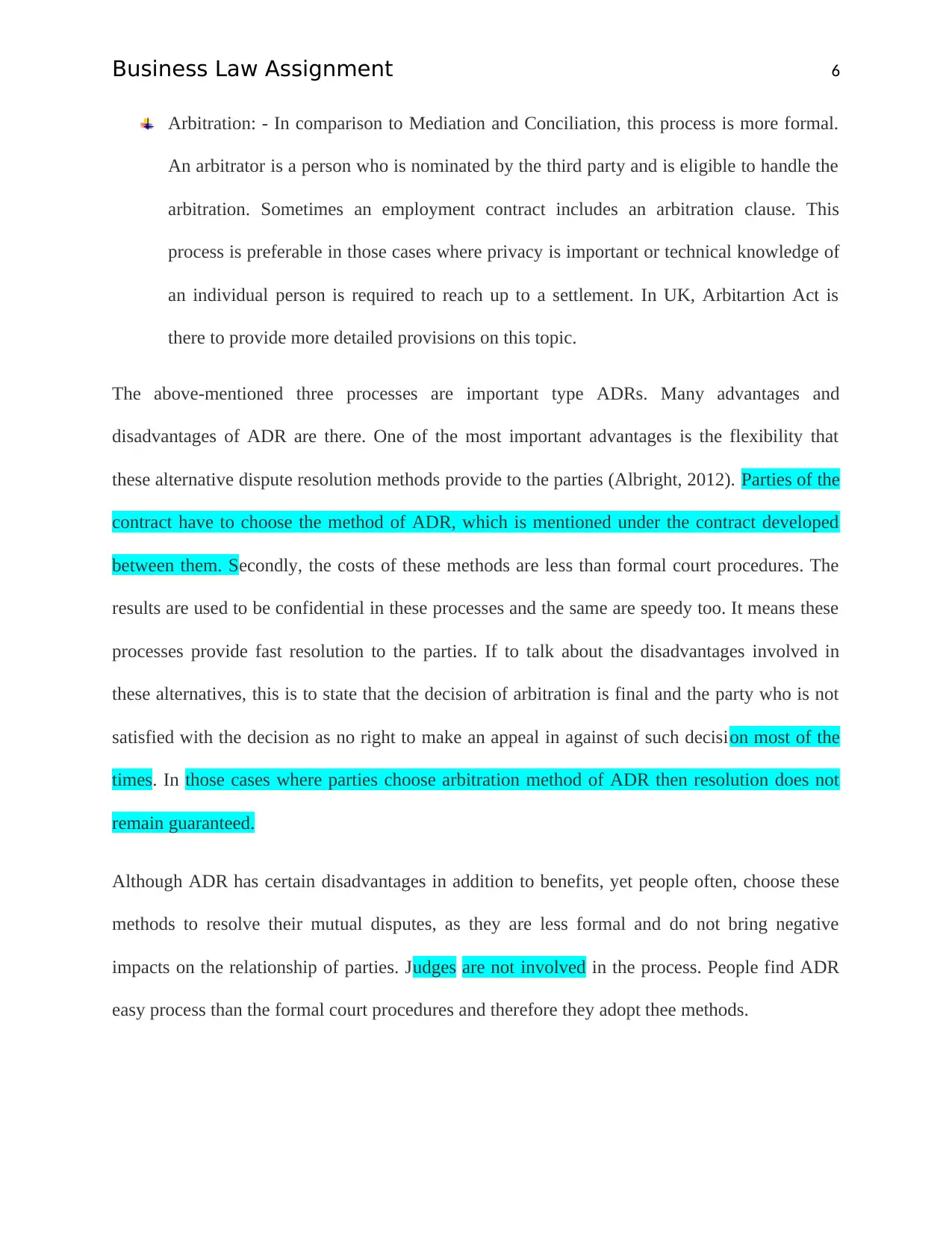
Business Law Assignment 6
Arbitration: - In comparison to Mediation and Conciliation, this process is more formal.
An arbitrator is a person who is nominated by the third party and is eligible to handle the
arbitration. Sometimes an employment contract includes an arbitration clause. This
process is preferable in those cases where privacy is important or technical knowledge of
an individual person is required to reach up to a settlement. In UK, Arbitartion Act is
there to provide more detailed provisions on this topic.
The above-mentioned three processes are important type ADRs. Many advantages and
disadvantages of ADR are there. One of the most important advantages is the flexibility that
these alternative dispute resolution methods provide to the parties (Albright, 2012). Parties of the
contract have to choose the method of ADR, which is mentioned under the contract developed
between them. Secondly, the costs of these methods are less than formal court procedures. The
results are used to be confidential in these processes and the same are speedy too. It means these
processes provide fast resolution to the parties. If to talk about the disadvantages involved in
these alternatives, this is to state that the decision of arbitration is final and the party who is not
satisfied with the decision as no right to make an appeal in against of such decision most of the
times. In those cases where parties choose arbitration method of ADR then resolution does not
remain guaranteed.
Although ADR has certain disadvantages in addition to benefits, yet people often, choose these
methods to resolve their mutual disputes, as they are less formal and do not bring negative
impacts on the relationship of parties. Judges are not involved in the process. People find ADR
easy process than the formal court procedures and therefore they adopt thee methods.
Arbitration: - In comparison to Mediation and Conciliation, this process is more formal.
An arbitrator is a person who is nominated by the third party and is eligible to handle the
arbitration. Sometimes an employment contract includes an arbitration clause. This
process is preferable in those cases where privacy is important or technical knowledge of
an individual person is required to reach up to a settlement. In UK, Arbitartion Act is
there to provide more detailed provisions on this topic.
The above-mentioned three processes are important type ADRs. Many advantages and
disadvantages of ADR are there. One of the most important advantages is the flexibility that
these alternative dispute resolution methods provide to the parties (Albright, 2012). Parties of the
contract have to choose the method of ADR, which is mentioned under the contract developed
between them. Secondly, the costs of these methods are less than formal court procedures. The
results are used to be confidential in these processes and the same are speedy too. It means these
processes provide fast resolution to the parties. If to talk about the disadvantages involved in
these alternatives, this is to state that the decision of arbitration is final and the party who is not
satisfied with the decision as no right to make an appeal in against of such decision most of the
times. In those cases where parties choose arbitration method of ADR then resolution does not
remain guaranteed.
Although ADR has certain disadvantages in addition to benefits, yet people often, choose these
methods to resolve their mutual disputes, as they are less formal and do not bring negative
impacts on the relationship of parties. Judges are not involved in the process. People find ADR
easy process than the formal court procedures and therefore they adopt thee methods.
Paraphrase This Document
Need a fresh take? Get an instant paraphrase of this document with our AI Paraphraser

Business Law Assignment 7
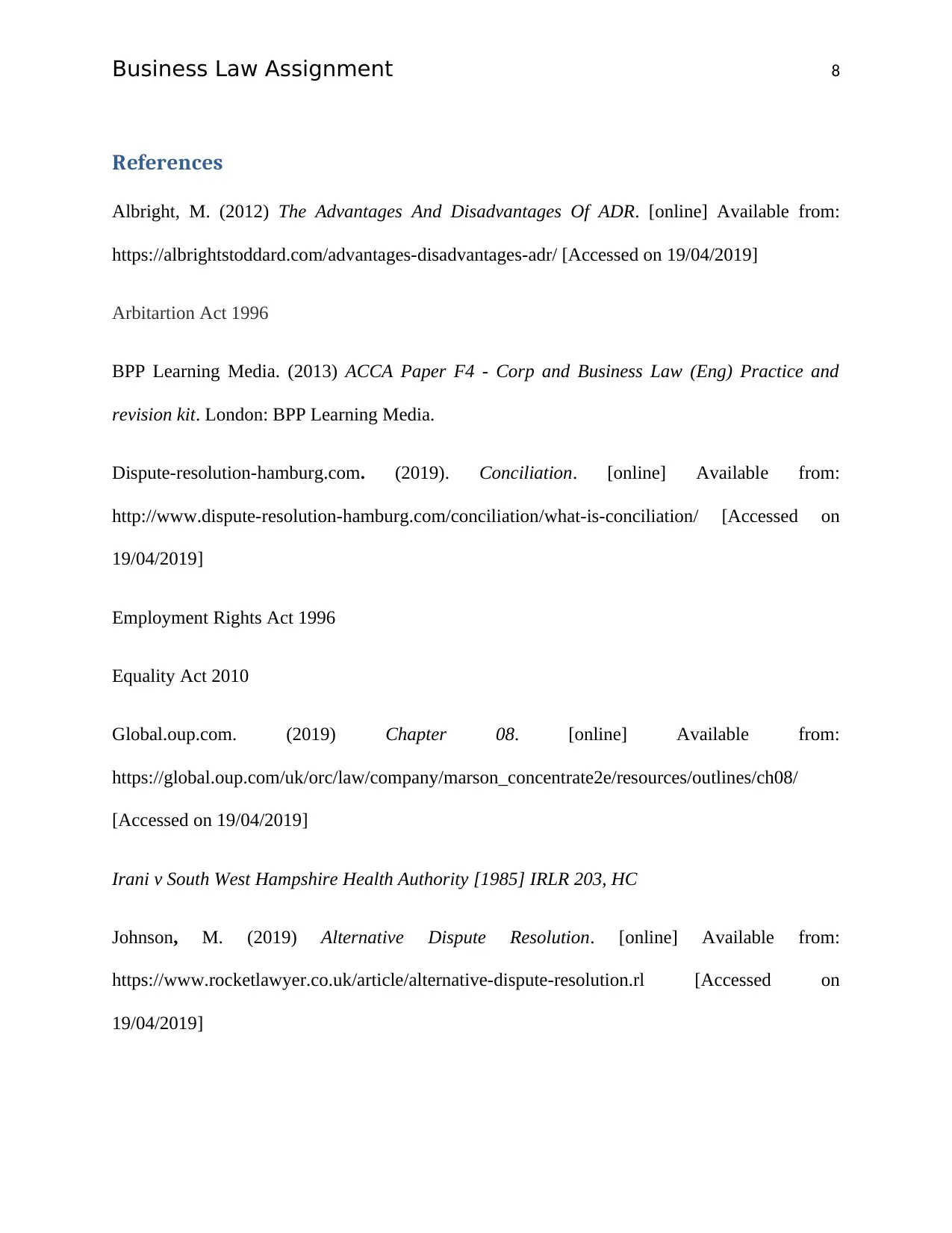
Business Law Assignment 8
References
Albright, M. (2012) The Advantages And Disadvantages Of ADR. [online] Available from:
https://albrightstoddard.com/advantages-disadvantages-adr/ [Accessed on 19/04/2019]
Arbitartion Act 1996
BPP Learning Media. (2013) ACCA Paper F4 - Corp and Business Law (Eng) Practice and
revision kit. London: BPP Learning Media.
Dispute-resolution-hamburg.com. (2019). Conciliation. [online] Available from:
http://www.dispute-resolution-hamburg.com/conciliation/what-is-conciliation/ [Accessed on
19/04/2019]
Employment Rights Act 1996
Equality Act 2010
Global.oup.com. (2019) Chapter 08. [online] Available from:
https://global.oup.com/uk/orc/law/company/marson_concentrate2e/resources/outlines/ch08/
[Accessed on 19/04/2019]
Irani v South West Hampshire Health Authority [1985] IRLR 203, HC
Johnson, M. (2019) Alternative Dispute Resolution. [online] Available from:
https://www.rocketlawyer.co.uk/article/alternative-dispute-resolution.rl [Accessed on
19/04/2019]
References
Albright, M. (2012) The Advantages And Disadvantages Of ADR. [online] Available from:
https://albrightstoddard.com/advantages-disadvantages-adr/ [Accessed on 19/04/2019]
Arbitartion Act 1996
BPP Learning Media. (2013) ACCA Paper F4 - Corp and Business Law (Eng) Practice and
revision kit. London: BPP Learning Media.
Dispute-resolution-hamburg.com. (2019). Conciliation. [online] Available from:
http://www.dispute-resolution-hamburg.com/conciliation/what-is-conciliation/ [Accessed on
19/04/2019]
Employment Rights Act 1996
Equality Act 2010
Global.oup.com. (2019) Chapter 08. [online] Available from:
https://global.oup.com/uk/orc/law/company/marson_concentrate2e/resources/outlines/ch08/
[Accessed on 19/04/2019]
Irani v South West Hampshire Health Authority [1985] IRLR 203, HC
Johnson, M. (2019) Alternative Dispute Resolution. [online] Available from:
https://www.rocketlawyer.co.uk/article/alternative-dispute-resolution.rl [Accessed on
19/04/2019]
⊘ This is a preview!⊘
Do you want full access?
Subscribe today to unlock all pages.

Trusted by 1+ million students worldwide

Business Law Assignment 9
Legislation.gov.uk. (2019) Right not to be unfairly dismissed. [online] Available from:
https://www.legislation.gov.uk/ukpga/1996/18/part/X/chapter/I [Accessed on 19/04/2019]
Working Time (Amendment) Regulations 2003
Legislation.gov.uk. (2019) Right not to be unfairly dismissed. [online] Available from:
https://www.legislation.gov.uk/ukpga/1996/18/part/X/chapter/I [Accessed on 19/04/2019]
Working Time (Amendment) Regulations 2003
1 out of 10
Related Documents
Your All-in-One AI-Powered Toolkit for Academic Success.
+13062052269
info@desklib.com
Available 24*7 on WhatsApp / Email
![[object Object]](/_next/static/media/star-bottom.7253800d.svg)
Unlock your academic potential
Copyright © 2020–2026 A2Z Services. All Rights Reserved. Developed and managed by ZUCOL.





